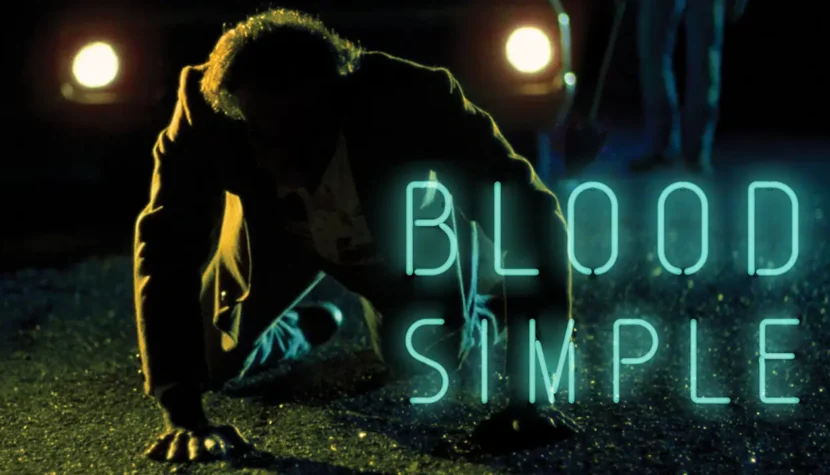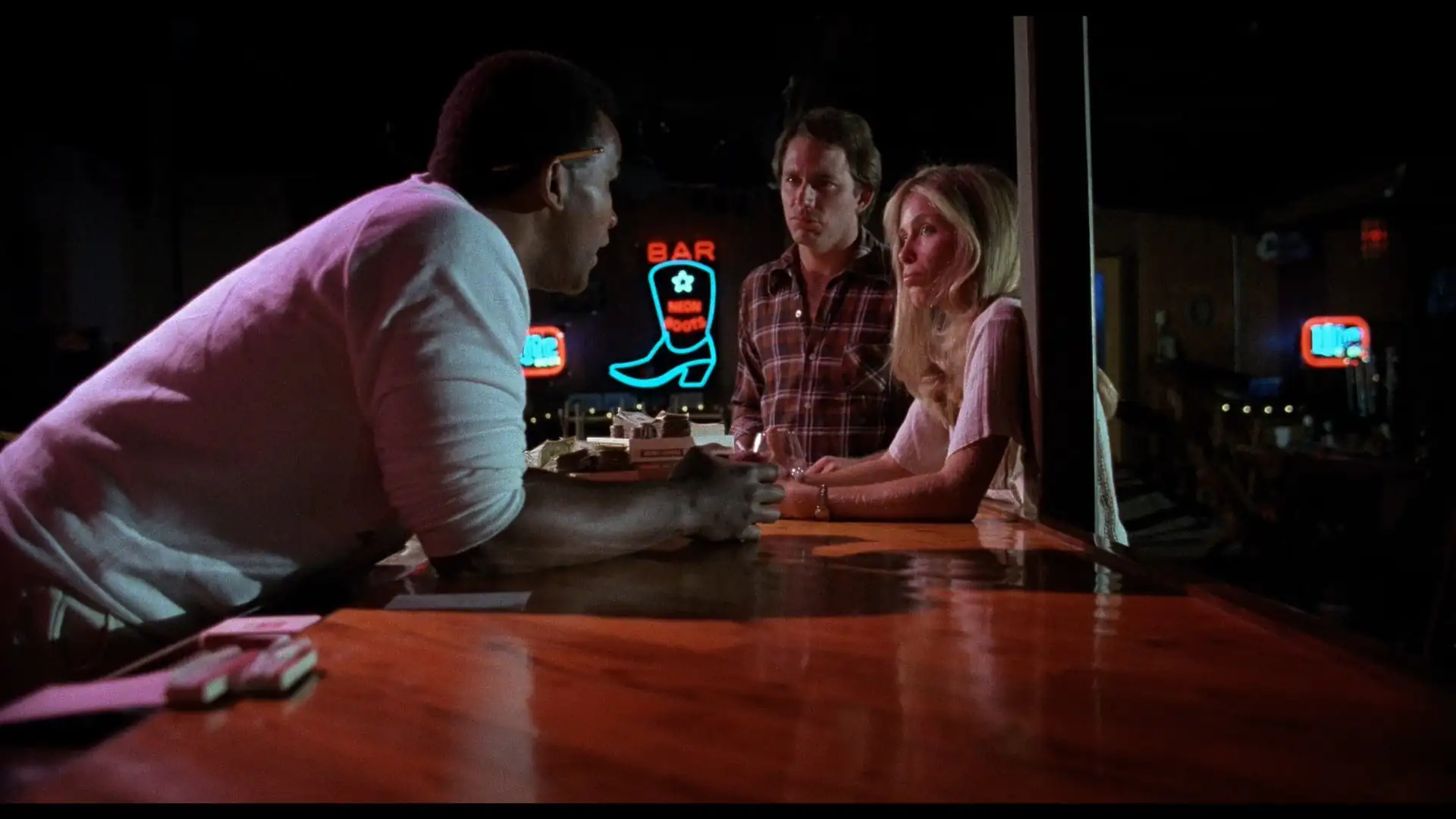BLOOD SIMPLE: Flawless Thriller and a Great Debut Explained

… but also one of the best debuts I have had the pleasure of watching. It is rare for a budding filmmaker (in this case, filmmakers) to create such a complete film. It wasn’t a sign of great talent, but already a fully formed and thought-out vision of cinema, which they have continued to create ever since, surprisingly blending violence, dark humor, and a genius of craftsmanship, while presenting chance as an inseparable element of the philosophy of life. Or maybe more than life, of death. Today, this seems obvious when looking at their debut from the perspective of their entire filmography. But when Blood Simple hit theaters in 1984, it must have appeared as something fresh, pulsating, and diabolically skillful.

It is no coincidence that this thriller returned to cinemas after sixteen years, presented as a director’s cut (a bit of an exaggeration, because the Coens only shortened it a bit and improved the sound) – it could very well have premiered today, whether as a re-release or something completely new. A remastered version was released on Blu-ray as part of the Criterion Collection, providing another reason to revisit Blood Simple. This text will not be a review, but rather an attempt to pay tribute to a film that deserves it just as much as the more famous works of the talented brothers.

The plot does not stray from the familiar black crime genre – a betrayed husband, the owner of a bar in Texas, hires a private detective to kill his unfaithful wife and her lover. This sentence contains a brief, yet quite accurate description of the first part of the film, before it shifts into high gear at the halfway point and becomes a bloody thriller mocking its characters. Until that moment, the characters are drawn with broad strokes, though this cannot be considered a flaw – the convention allows, and even requires, a certain degree of convention so that the viewer knows from the start what they are watching.

The husband (nervous, always tense Dan Hedaya) is a jerk and a particularly unsympathetic type, which justifies the wife’s transgression (the debuting, already skillfully fitting in with the Coens, Frances McDormand), who seems to be a completely innocent person. The lover (giving the whole story a tragic touch, John Getz) is honest with the woman but also tough, silent, and above all, unyielding towards her husband, who is also his employer. The detective, from the very beginning, plays with his client’s situation, mocking the wife’s infidelity and readily accepting the commission for a double murder. He is played by M. Emmet Walsh, with a constantly affixed smile of a sly simpleton. The film begins with his narration, in which he explains that in Texas, everyone is left to fend for themselves; it is not hard to guess how quickly he will conclude that it is easier to kill one person instead of two, while earning the same amount of money.

But then a strange twist occurs, turning the characters from noir film figures into helpless participants in a drama, unable to escape the snowballing intrigue. The precision with which the filmmakers set a trap for everyone is admirable, yet at the same time, it is incredibly simple – none of the characters are allowed access to the whole truth, so their assumptions, which often replace the truth, decide the course of the action. Every attempt to piece everything together into a cohesive whole must end in failure.

The film lulls our vigilance for a long time, forcing us to watch the slowly unfolding story from a slight distance. It is hard to find a more vivid example of a typical black crime situation, but Blood Simple contains many moments that seem empty on the surface, which do not advance the action, but serve more as the building blocks that give the film its specific pace and atmosphere. The characters repeatedly stare into the distance, like frozen statues, probably searching for meaning and an explanation for themselves. I write “probably,” because it is hard to truly specify what is on their minds. Of course, eventually, answers are given to why the husband stares at the nearby bar’s smoking area or why the windmill in his office is such an important decorative element. But over time, it turns out that we, the viewers, do not know everything. While the intrigue seems to have no logical gaps, and all the actions of the characters are a consistent and credible result of preceding events, the confusion that begins to dominate at some point becomes the main attraction of the film. We do not have access to the characters’ thoughts, but we understand how their imagination works. Because at a certain point, that is all they have left – not facts, but the imagination of facts. It is easy to turn a thriller into a comedy of errors, but the Coens never forget for a moment which genre is paramount, subordinating all others to it.

In his review (Film, 10/2000), Andrzej Kołodyński wrote that “one should not wonder about the logic of events.” But yes, one should! The Coens’ debut is at its best when we observe, step by step, the development of the intrigue and the details that lead to the characters’ incorrect interpretation of events. It is one of the few cases of a crime story in which the viewer somewhat outpaces the characters, knowing much more than they do. Instead of being irritated, the viewer is rewarded. Absurd? Yes, but that is precisely what the Coens built their entire career on. The final scene of Blood Simple is proof of this – we identify with the main antagonist because he is the only one who knows more than the others. The final joke, however, is on the person who seems to have won, but is she really victorious, since she remains completely ignorant of the mechanisms of the entire plot? Probably yes, because at the same time, she escapes the absurdity, which, as it turns out, is deadly to the other participants.

The viewer gladly falls into the Coens’ trap, admiring their freedom in moving between seriousness, very stylish pulp, and a typical horror film poetics (it is no coincidence that Joel’s filmography includes Evil Dead, which he helped edit). The latter is most evident in the sequence of disposing of the body, which in the film has the character of a tedious, wordless, and hopeless journey to hell. Apocalyptic motifs can be heard in the words of the preacher coming from the car radio, which in this case emphasizes the gravity of the situation rather than mocking it. Both participants in the expedition think that their partner is dead, but the irony underlying this idea seems to be deeply hidden. What matters is only the horror arising from the misinterpreted necessity. This whole sequence is so intense and memorable that when later in the film the dead character returns to life, we hardly notice that we are dealing with what might seem like an obvious dream sequence. However, this, even though it is clearly a fantastic vision, finds its surprising reflection in the finale, which is very realistic and devoid of any dreamlike elements, which again upends the convention.

And how can we trust them? We can be sure of nothing, just like the characters, who toss from one thought to the next, uncertain of the other person, alone in their doubts and assumptions. The Coens possess an incredible ability to show failed relationships, broken communication, and absurd attempts at understanding each other, the result of which is almost always someone’s death. Perhaps they are so good at it because they themselves have no problem with it.

